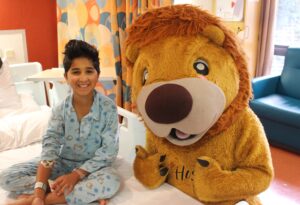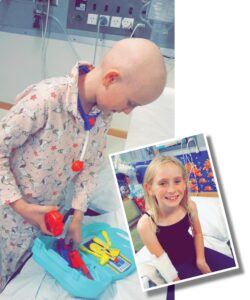Wellington Regional Children’s Hospital sees a significant increase in the number of children who are admitted to hospital over the winter months, and many of these children come in without a pair of pyjamas. Our community nursing teams also visit children in homes that are often cold and damp, which leaves young children even more vulnerable to complications from asthma (with one in seven kiwi kids diagnosed as asthmatic) and other nasty respiratory infections.
We also know that right now many kiwi families in our region will be facing an uncertain financial future, and there may be little leftover money to spend on extras like warm PJs.

Hospi, with Wellington Children’s Hospital patient Aayush.
Now that our hospitals’ strict visitor policies have been lifted for Covid19 Alert Level One, we can gratefully accept all physical donations of PJs at Wellington Hospital, Kenepuru Hospital and Kapiti Health Centre.
Please help keep sick kids warm by donating
NEW flannelette PJs, sizes 1-16 (with an approved fire hazard label). Pyjamas can be dropped in to the main reception areas. Or DONATE HERE and Hospi and the Wellington Hospitals Foundation team will buy a pair of warm winter pyjamas on your behalf.
Charlotte Stanczuk, Clinical Nurse Specialist for Wellington Regional Children’s Hospital says, “This appeal will make a huge difference this winter for the many children who come to hospital. We also have a large number of sick children in our care who are seen at home by our community nurses. Pyjamas will be distributed to these children too. Thank you to the community for helping keep our sick kids warm this winter.”

Tamsin – dancer, horse rider and Wellington Children’s Hospital cancer patient
Nine year old Tamsin’s journey with Wellington Children’s Hospital started suddenly one evening when she was diagnosed with leukaemia. Mum Hayleigh told us, “It’s something you never imagine you will hear, and at such a terrifying time we were extremely grateful for the hospital and the team right from the moment we arrived. With such a scary journey ahead being told we were in for the long haul was daunting, but Tamsin was snuggled into some nice warm PJs provided by the hospital for the night, a small comfort that makes a world of difference to a scared child.”
